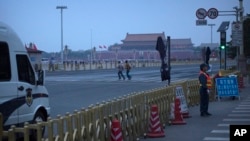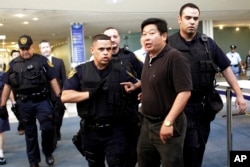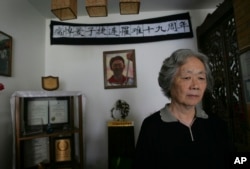Harassing phone calls, surveillance of the elderly, an apparent hack attack, detentions and a broad net of censorship online.
These are but a few of the tactics Chinese authorities have been using both at home and abroad in recent days and weeks to ensure there is little to no public discussion of the 27th anniversary of the Tiananmen Square crackdown in China.
Anniversary event hijacked
Yang Jianli, a former Tiananmen activist, said that just as he was supposed to host an online forum on Friday to mark the anniversary, it was hijacked.
The forum was going to include participants from six cities worldwide, including Hong Kong, Tokyo and Paris. Nearly 1,000 people were registered to participate.
“But in the end, we could only broadcast from Washington D.C. and only the participants from Washington D.C. could speak,” Yang said. “The others could watch and listen but could not speak because the system we tried to use was paralyzed. Hacked severely.”
Yang said that at the same time he was about to begin hosting the conference the harassing calls began. More than 12 hours later they were still coming.
“And as we have been speaking (during the interview) two more calls came in. And then another one,” he said. Yang said that when he answers the call, no one says anything.
But the “more the government tightens up (its controls), the more relevant Tiananmen is to the current situation,” he said.
Testing authorities' resolve
Each year, and ever since the crackdown took place, Chinese authorities have been working tirelessly to enforce what some call a historical amnesia of the events of June 4, 1989. But each year, there are those who continue to test the resolve of the government both in China and overseas, demanding a full account of what happened or working to make sure that June 4 is not forgotten.
This year, as the anniversary was approaching, groups of activists have gathered in numerous locations throughout China and posted photos on social media urging the public to not forget. In some photos, citizens revealed their faces, in others they wore masks.
Four activists, including Qi Zhiyong, whose legs were maimed when a tank ran over them on the night of June 3, have been traveling around China taking photographs of themselves wearing T-shirts, which read “June 4th Never Forget.”
To this day, the number of students and citizens who were killed when tanks and troops rolled into the city to disperse peaceful protesters is unknown.
In one photo posted on Weibo, which has Tiananmen Square in the background and Mao Zedong’s portrait, the post read: “Li Xiaoling and Tiananmen victim Qi Zhiyong visit a familiar place to look for his left leg.” The photo has since been removed.
In China’s southwestern province of Sichuan, two individuals were detained after they tried to sell bottles of limited edition liquor commemorating the crackdown. The bottles featured an image similar to the iconic photo “Tank Man” of the man who stood in front of a column of military tanks near Tiananmen Square. On the bottle of liquor, however, there is a man sitting cross-legged on the ground with a laptop computer.
Tank Man UNESCO bid
Recently, Yang Jianli and his group, Initiatives for China, along with photographer Charlie Cole and the Newseum nominated images and video of Tank Man to be accepted into the UNESCO Memory of the World Register. The nomination includes material from five photojournalists and two cameramen who shot the images.
“China of course is definitely going to push back. China has tremendous influence in the U.N. We all know that,” Yang said. “But we stand some chance.”
A final decision on the matter won’t be made until next year and Yang adds that it is likely that a final decision will rest on the shoulders of the director-general of UNESCO, Irina Bokova. The director-general is also in the running for the post of United Nations Secretary-General now held by Ban Ki-moon.
To this day the identity of Tank Man is still unknown, much like the total number of those killed in the crackdown.
Estimates from rights groups and witnesses range from several hundred to several thousand.
Final verdict?
And while many of China’s younger generation know little about the incident, China has ruled that its verdict on the bloody June 4 crackdown of peaceful protesters or what it calls a “political disturbance” is final.
But that has not stopped parents of those who were killed from pressing the government each year for three simple things: the truth, accountability and compensation. In return, authorities have ignored their requests and instead put many of the parents, some in the 70s and 80s, under surveillance.
In a statement released earlier, the group said that for the past 27 years they have been living in a state of “white terror and suffocation.” Members of the group they said are eavesdropped on, followed and even detained. Their computers are searched and confiscated.
“The police use contemptible means such as making up stories, issuing threats, etc. against us,” the statement said.
Earlier in March, Tiananmen Mothers co-founder Ding Zilin, 79, spoke with VOA about the surveillance she was under and her frustrations with authorities' “arrogance” and unwillingness to even respond to the group’s annual letters.
She also talked about how angry authorities get whenever she is interviewed by Western media.
“It’s laughable that they would use such high-tech methods to keep me under surveillance. Isn’t that such a waste,” Ding said.
Ding, who lost her son during the Tiananmen crackdown, and recently her husband and daughter as well, has been barred, from April through the anniversary, from receiving any visitors that are not approved by the Beijing Public Security Bureau.
And if they are allowed to come, only one can visit at a time, according to the group Tiananmen Mothers.






